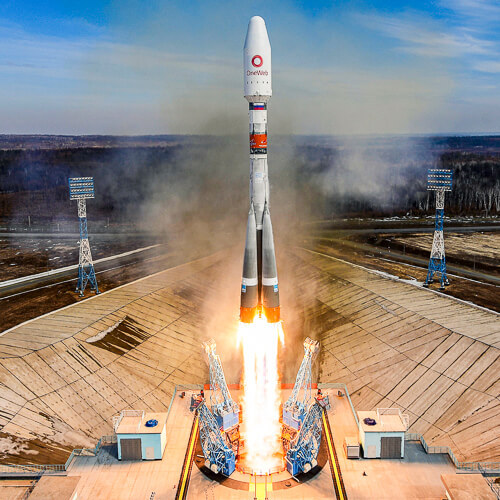
No juicy market can stay a monopoly for long.
So as satellite broadband heats up, unlikely British contender OneWeb is giving full-throttle chase to the bookies' favorite, Elon Musk's Starlink.
SpaceX's Starlink last week saw a Falcon 9 rocket ferry 60 satellites from Florida's Cape Canaveral to space, boosting its number of orbiting broadband transmitters to over 1,300. The rocket, on its sixth mission, was caught by the stalwart drone ship Of Course I Still Love You.
Figure 1:  Take off: UK-based OneWeb is taking on the might of Elon Musk's SpaceX and Starlink.
Take off: UK-based OneWeb is taking on the might of Elon Musk's SpaceX and Starlink.
(Source: Roscosmos, Space-Center-Vostochny and TsENKi)
But after launching 36 satellites last Thursday from the Vostochny Cosmodrome in Russia's far east, OneWeb now has 146 satellites of a planned 648 in orbit. France's Arianspace carried the payload, on its medium-lift Soyuz-2.
The satellites launched into a near polar orbit at 450 kilometers, then separated, raised themselves up to their operational orbit, and acquired signal from the rest of the network.
Not bad when you consider OneWeb has only just bounced back from bankruptcy, with the UK government and India's telecoms group Bharti Global rescuing it for $1 billion in November 2020.
The new joint owners poached Neil Masterson, Thomson Reuters' chief operating officer, as new CEO.
Let's get together and beam all right
He expects to firm up deals in the next few days with maritime and aviation industry network providers, he says.
The company is having "quite advanced conversations" in the UK, Canada, the Nordics, Africa and Australia. Deals are in place with Hughes Satellite Systems and Alaska's telecoms provider PDI.
OneWeb, which is selling capacity wholesale to governments and businesses, takes a slightly different tack to Starlink, which is already signing up users directly in the US, UK and Canada.
Even the UK's BT Group has broached using OneWeb to reach rural customers who might otherwise flutter their eyelashes towards Musk's alternative.
The UK also has a $6.9 billion pot of cash in Project Gigabit, offering broadband in areas with little or no Internet access. SpaceX and OneWeb are both eyeing some of those pennies.
Two Webs
So there may soon be more than one web in space – it all comes down to the success of Masterson's cash-for-satellites fundraising.
SoftBank Group, previously the lead shareholder, invested another $350 million in January, but the company needs one billion more.
There are still questions.
OneWeb "is still pushing the line of connecting millions of consumers," says telecoms analyst Doug Mohney.
Except "it isn't clear how many resellers have signed up to connect them, how much end-user cost will be (depends on reseller markup), and what area gets first crack," he says.
There's gold in them there glaciers
Beaming Internet into the Arctic sounds niche, until it isn't.
With a melting polar ice cap exposing opportunities for shipping, energy production, and resource mining, Moscow and Washington look increasingly set to square off in the high arctic. Officials from the US Pentagon have paid visits to both companies.
Not great obviously if you're a polar bear.
Better if you're in polar orbit, though. Telecoms satellites flying over the equator, as most of them tend to, can't quite see over the curvature of the earth to the polar regions.
Want to know more about satellite? Check out our dedicated security channel here on Light Reading.
SpaceX improved its Arctic chops by engaging retired General Terrence O'Shaughnessy, former commander of US Northern Command.
When still in uniform, O'Shaughnessy asked Congress for $130 million for a polar communications program leveraging both SpaceX and OneWeb's assets.
Meanwhile one of Starlink's pilots, an ostensibly secret collaboration with Kerry County Council, aims to gauge how Musk's network could address longstanding communications problems in Kerry's Black Valley, which suffers from poor landline and mobile connectivity.
Secrets, however, are few in rural Ireland.
And so the kit has just made its way there, including a long cable and an indoor box "the size of a lump of turf."
Related posts:
— Pádraig Belton, contributing editor special to Light Reading
Read more about:
EuropeAbout the Author(s)
You May Also Like




_International_Software_Products.jpeg?width=300&auto=webp&quality=80&disable=upscale)







